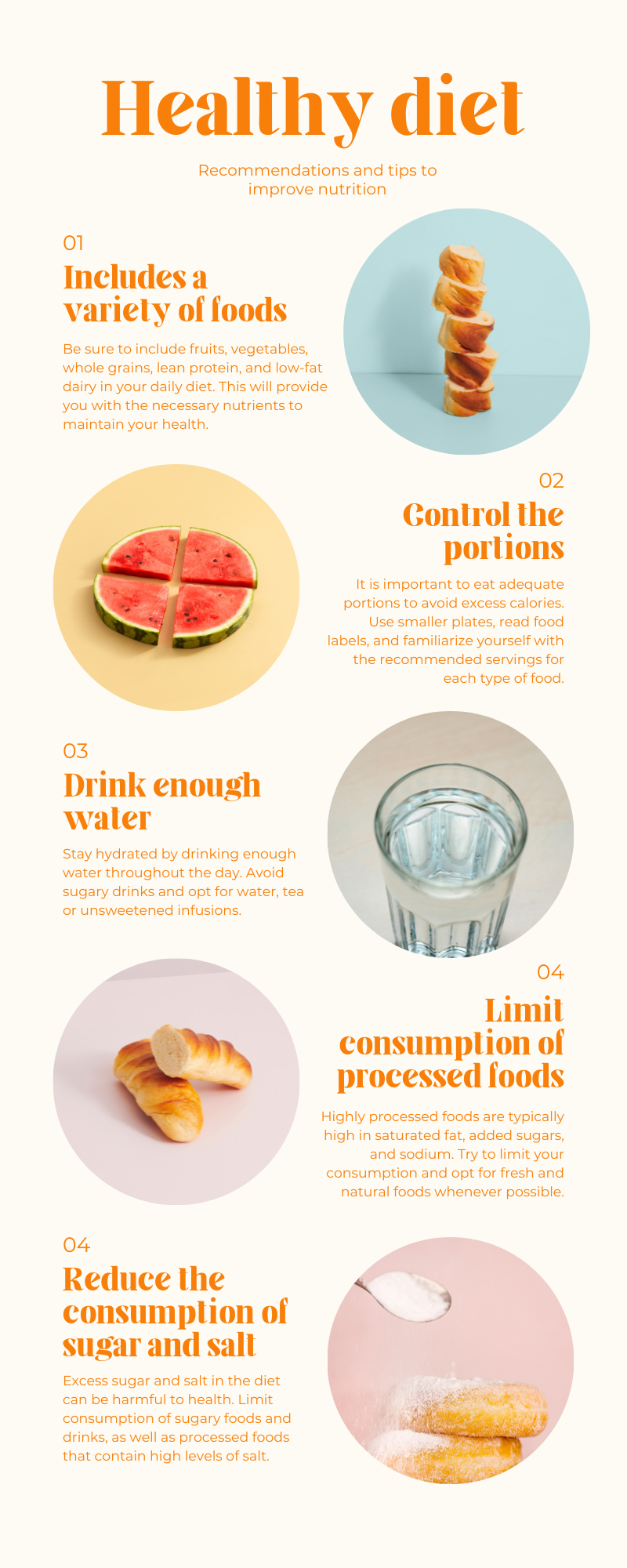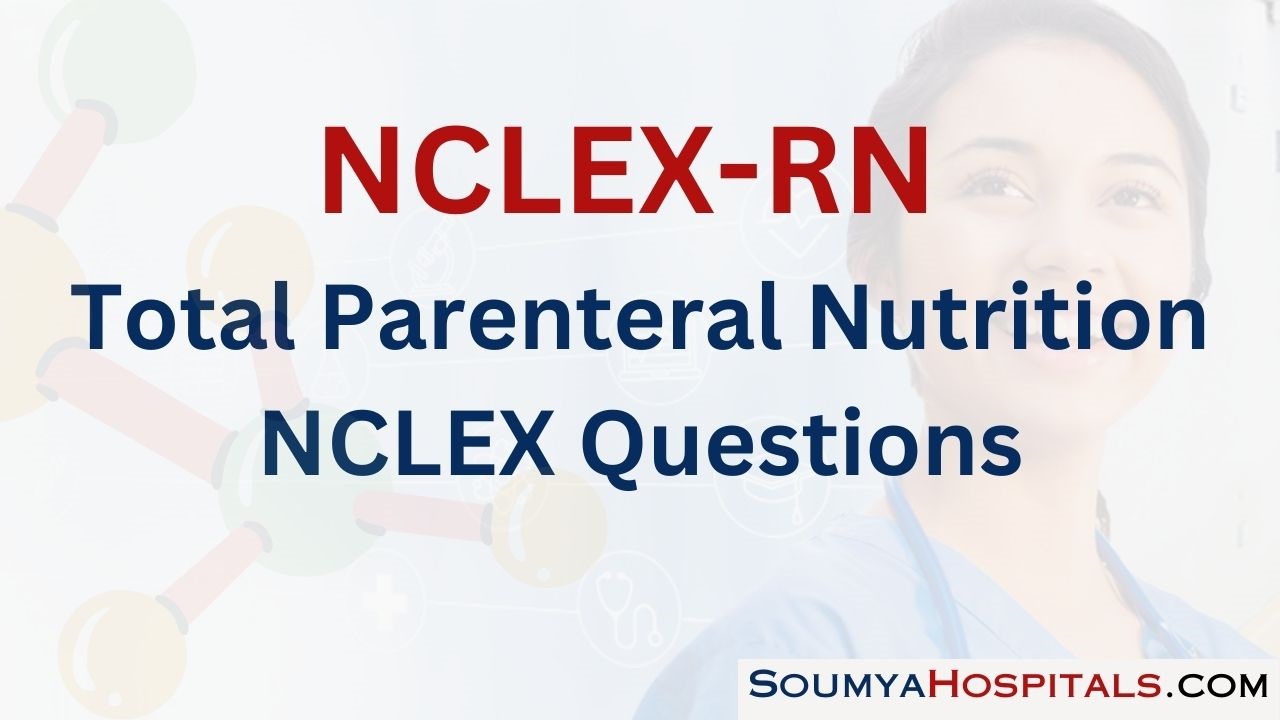Working through NCLEX PN Study Guide can boost confidence and reduce test anxiety by building familiarity and competence.
NCLEX Total Parenteral Nutrition Questions - NCLEX Questions on Total Parenteral Nutrition
Total Parenteral Nutrition NCLEX Questions Test Strategies
Point 1.
We should not administer lipid emulsions to patients who have altered fat metabolism or conditions that disrupt normal fat metabolism, such as pathologic hyperlipidemia.
Point 2.
We know that TPN contains many nutrients including amino acids. We should monitor blood urea nitrogen and creatinine levels as there could be excess amino acid intake on TPN therapy.
Point 3.
Skin integrity changes and wound healing are used as parameters in monitoring the effectiveness of TPN feeding.
Point 4.
People with pulmonary edema or any coagulation disorders have a lot of tendency of having fat embolism when TPN is concomitantly administered. So, we should be very careful in this scenario.
When dextrose is infused too rapidly for clients requiring adjustment in insulin dosage, the patient may suffer from Hyperglycemia. The patient may complain of thirst or have polyuria in such case. We should be careful not to infuse TPN rapidly or monitor glucose level properly.
Let's take a question.
A patient undergoing TPN therapy is complaining with the problems of excessive thirst and polyuria. What should be your intervention in this case?
Infuse dextrose rapidly
Monitor the glucose level and adjust the dextrose infusion
Do nothing. This is just a common side effect which resides by itself.
Stop TPN immediately
Point 5.
TPN is administered into a vein, generally through a PICC (peripherally inserted central catheter) line, but can also be administered through a central line or port-a-cath. TPN is a hypotonic solution and very concentrated than that of blood and, therefore, can cause irritation to vain so administered to the central vein.
Point 6.
TPN can also cause electrolyte imbalance and acid base balances whose signs include abdominal cramps, lethargy, confusion, malaise, muscle weakness, tetany, convulsions, and cardiac arrhythmias.

Point 7.
Albumin levels may drop initially in a client receiving total parenteral nutrition as hydration is restored. Patients undergoing TPN therapy must be checked with their protein level.
Point 8.
Never add medications to a total parenteral nutrition solution container once it is actively infusing.
Point 9.
Infuse or discard any total parenteral nutrition solution within 24 hours once the administration set is attached.
Point 10:
Clients receiving total parenteral nutrition ideally should gain 0.5 to 1 kg/week; weight gain greater than 0.5 kg/day indicates fluid retention.
Total Parenteral Nutrition NCLEX Practice Questions
Question 1.
Nurse Rynki is caring for a patient who has been receiving TPN for the past week. The patient has been experiencing abdominal cramps, lethargy, confusion, malaise, muscle weakness, and tetany. Rynki checks the patient's electrolyte levels and finds that they are imbalanced.
What should Nurse Rynki do to address the patient's electrolyte imbalance?
(a) Administer medications to the patient's TPN solution.
(b) Discard the TPN solution and start a new one.
(c) Administer electrolyte supplements to the patient.
(d) Increase the rate of TPN infusion.
Answer:
(c) Administer electrolyte supplements to the patient.
Explanation:
Nurse Rynki should consider the patient's symptoms and the fact that TPN can cause electrolyte imbalances. She should also consider the fact that adding medications to the TPN solution or increasing the rate of infusion would not address the patient's electrolyte imbalance. The best option to address the imbalance is to administer electrolyte supplements to the patient.
Rationale:
Option (a) is incorrect because it is not recommended to add medications to a TPN solution once it is actively infusing. Option (b) is incorrect because discarding the TPN solution would not address the patient's electrolyte imbalance.
Option (d) is incorrect because increasing the rate of TPN infusion would not address the electrolyte imbalance and could potentially cause further problems. Option (c) is the correct answer because electrolyte supplements can help restore the balance of electrolytes in the patient’s body.
Question 2.
A patient, Mary, is admitted to the hospital with severe gastrointestinal issues that prevent her from receiving nutrition orally. She has been prescribed TPN as a means of providing her with the necessary nutrients. As a registered nurse, you are responsible for administering the TPN to Mary.
Which of the following is NOT an ingredient in TPN solutions?
(a) Water
(b) Energy
(c) Amino acids
(d) Insulin
Answer:
(d) Insulin
Explanation:
TPN solutions are designed to provide the body with the necessary nutrients that it cannot obtain through oral intake. This includes things like water, energy, amino acids, essential fatty acids, vitamins, minerals, and trace elements. Insulin is not a necessary nutrient for the body, but rather a honnone that helps regulate blood sugar levels. Therefore, it is not typically included in TPN solutions.
Rationale:
Option (a) Water is a necessary ingredient in TPN solutions as it helps to provide hydration and support the body's various functions. Option (b) Energy, in the form of calories, is also an important component of TPN as it helps to provide the body with the fuel it needs to function.
Option (c) Amino acids are essential for the body's growth and repair, and are therefore included in TPN solutions. Option (d) Insulin is not typically an ingredient in TPN solutions, as it is a honnone that helps regulate blood sugar levels and is not a necessary nutrient for the body. Therefore, the correct answer is (d) Insulin.
Question 3.
Mrs. Agrima is a 45-year-old patient who has recently undergone surgery for bowel cancer. Due to the surgery, her GI tract is not functioning properly and she is unable to eat or drink. The healthcare team decides to initiate Total Parenteral Nutrition (TPN) as a way to provide Mrs. Agrima with necessary nutrients. Mrs. Agrima's TPN solution consists of water, energy, amino acids, essential fatty acids, vitamins, and minerals. One day, Mrs. Agrima complains of excessive thirst and polyuria. The nurse on duty recognizes these symptoms as potentially related to TPN therapy and takes action.
What should the nurse do in this situation?
(a) Infuse dextrose rapidly.
(b) Monitor the glucose level and adjust the dextrose infusion.
(c) Do nothing. This is just a common side effect which resides by itself.
(d) Stop TPN immediately.
Answer:
(b) Monitor the glucose level and adjust the dextrose infusion.
Explanation:
To solve this problem, the nurse should consider the potential causes of excessive thirst and polyuria in a patient receiving TPN therapy. These symptoms could potentially be caused by an electrolyte imbalance or hyperglycemia. The nurse should therefore consider monitoring the patient's glucose levels and adjusting the dextrose infusion as needed.
Total Parenteral Nutrition (TPN) is a method of providing nutrients to patients who are unable to eat or drink due to a functioning GI tract or disorders requiring complete bowel rest. TPN solutions are customized to the needs of the i ndividual patient and may contain water, energy, amino acids, essential fatty acids, vitamins, and minerals.
It is important for nurses to consider the potential side effects and complications of TPN therapy, including electrolyte imbalances, acid-base imbalances, and hyperglycemia. Excessive thirst and polyuria could potentially be caused by an electrolyte imbalance or hyperglycemia, and it is important for the nurse to monitor the patient's symptoms and take appropriate action if necessary. In this case, the correct action would be to monitor the patient’s glucose levels and adjust the dextrose infusion as needed to avoid the risk of hyperglycemia.
Rationale:
Option (a) Infuse dextrose rapidly is incorrect because rapidly infusing dextrose can cause hyperglycemia, which could lead to the symptoms of excessive thirst and polyuria. Option (c) Do nothing. This is just a common side effect which resides by itself is incorrect because it is important for the nurse to actively monitor the patient's symptoms and take appropriate action if necessary.
Option (d) Stop TPN immediately is incorrect because TPN is a necessary form of nutrition for the patient and should only be stopped if there are serious adverse effects or if it is no longer needed. Option (b) Monitor the glucose level and adjust the dextrose infusion is the correct answer because it involves actively monitoring the patient's symptoms and taking appropriate action to address any potential issues related to TPN therapy.
Question 5.
Mrs. Agrima is a 60 year old patient who has recently undergone surgery for colon cancer. She has a temporary ileostomy and is unable to eat or drink due to her bowel being in rest. The doctor orders TPN to be administered to Mrs. Agrima to provide her with the necessary nutrients and hydration. As a registered nurse, you are responsible for administering the TPN to Mrs. Agrima .
When administering TPN to Mrs. Agrima , which of the following should be considered?
(a) The volume of liquid intake
(b) The patient's fat metabolism
(c) The patient's insulin dosage
(d) All of the above
Answer:
(d) All of the above
Explanation:
To solve this problem, you should consider all of the important points when administering TPN to Mrs. Agrima . This includes considering the volume of liquid intake, the patient's fat metabolism, the patient's insulin dosage, and any other factors that may affect the effectiveness of the TPN.
Rationale:
Option (a) the volume of liquid intake, is important because patients with heart or kidney disorders may require a limited volume of liquid intake while those with respiratory failure require a liquid emulsion that provides most of the nonprotein calories.
Option (b) the patient's fat metabolism, is important because TPN contains many nutrients including essential fatty acids and should not be administered to patients who have altered fat metabolism or conditions that disrupt normal fat metabolism.
Option (c) the patient’s insulin dosage, is important because when dextrose is infused too rapidly, the patient may suffer from hyperglycemia and require adjustments in their insulin dosage. All of these options are important considerations when administering TPN to Mrs. Agrima . so the correct answer is (d).
Question 6.
Mrs. Agrima is a 65 year old patient who was recently admitted to the hospital with severe pancreatitis. Her condition has caused her GI tract to shut down, making it impossible for her to consume any food or fluids orally. The healthcare team decides to start her on TPN. As a registered nurse, you have been assigned to administer the TPN to Mrs. Agrima .
What is the main purpose of TPN?
(a) To provide nutrients to patients with functioning GI tracts
(b) To provide nutrients to patients who have disorders requiring complete bowel rest
(c) To provide nutrients to patients with heart or kidney disorders
9d) To provide nutrients to patients with respiratory' failure
Answer:
(b) To provide nutrients to patients who have disorders requiring complete bowel rest
Explanation:
TPN is a method of providing nutrition to patients through the veins. It is used for patients who do not have a functioning GI tract or who have disorders requiring complete bowel rest. TPN solutions are customized for individual patients according to their age, nutritional needs, and organ function. TPN provides calories, restores nitrogen balance, and replaces essential fluids, vitamins, electrolytes, minerals, and trace elements.
It is important for nurses to consider several factors when administering TPN, such as potential electrolyte imbalances, acid-base imbalances, and the risk of fat embolism in certain patients. TPN is generally administered through a PICC line, central line, or port-a-cath, and must be infused or discarded within 24 hours once the administration set is attached.
Rationale:
Option (a) is incorrect because TPN is not used for patients with functioning GI tracts. Option (c) is incorrect because while TPN may be used for patients with heart or kidney disorders, this is not the main purpose of TPN. Option (d) is incorrect because while TPN may be used for patients with respiratory failure, this is not the main purpose of TPN. Option (b) is correct because TPN is used to provide nutrients to patients who have disorders requiring complete bowel rest.
Question 7.
Mrs. Gunjan is a 58 year old patient who has been admitted to the hospital for malnutrition. She has been experiencing difficulty swallowing due to an esophageal stricture and has not been able to maintain a healthy diet. The doctor has decided to initiate TPN as a means of providing nutrition for Mrs. Gunjan. As a registered nurse, you will be responsible for administering the TPN and monitoring Mrs. Gunjan's progress.
What should be considered when administering TPN to a patient with altered fat metabolism or conditions that disrupt normal fat metabolism?
(a) The TPN should be administered through a PICC line.
(b) The patient should be monitored for signs of electrolyte imbalance.
(c) The TPN should not be administered.
(d) The patient's protein levels should be checked.
Answer:
(c) The TPN should not be administered.
Explanation:
To solve this problem, the nurse must be familiar with the contraindications for TPN administration. In this case, the patient has altered fat metabolism or conditions that disrupt normal fat metabolism, which is a contraindication for TPN administration.
Rationale:
Option (a) is incorrect because the type of access used for TPN administration does not affect the contraindications for TPN. Option (b) is incorrect because electrolyte imbalances are a potential complication of TPN, but are not a contraindication for its use. Option (d) is incorrect because protein levels may drop initially in a patient receiving TPN, but this is not a contraindication for its use.
Option (c) is the correct answer because TPN should not be administered to patients with altered fat metabolism or conditions that disrupt normal fat metabolism. This is because TPN contains essential fatty acids and lipid emulsions, which can exacerbate these conditions and potentially cause harm to the patient.

Also Read:
